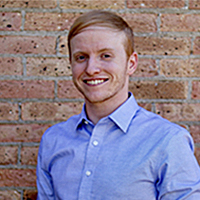Marcus Deloney

University of California
Biomedical Engineering PhD Candidate
Education
University of Michigan, BSE Chemical Engineering, 2014
University of Michigan, MSE Chemical Engineering, 2016
Career Summary
During my time as a master’s student at Michigan, I took full advantage of the strength of the chemical and biomedical engineering departments by taking elective courses in both departments, focusing on tissue and protein engineering as well as biomanufacturing. The most influential experience I had while at Michigan was working in Professor Tim Scott’s lab. Working with him opened by eyes to the world of organic polymer chemistry and their broad applications — especially biopolymers.
Coursework wise, two of the most significant classes I took while completing my master’s were: biomanufacturing with Professor Henry Wang and protein engineering with Professor Fei Wen. Biomanufacturing with Professor Want opened my eyes to biopharmaceuticals and their benefit over traditional small molecule drugs and piqued my interest in the industry. In the protein engineering course, Professor Wen allowed us into her research lab and taught us the basics of protein engineering and cellular-based therapies — something I would have never experienced nor expected to enjoy, but I did! Both courses influenced me to pursue my PhD in biomedical engineering focusing on biopharmaceuticals and clinical translation. My current project involves polymeric nanoparticles to encapsulated biopharmaceuticals to treat post-traumatic osteoarthritis.
How does your master’s degree differentiate you from others?
My master’s degree has helped me stand out because I am now uniquely qualified as a chemical and biomedical engineer now. It allows me to intelligently converse with engineers about process specification and pilot plant scale-up, while also being able to troubleshoot with biologist/biomedical professionals about cell-based experiments. Serving as the “go-between” for both groups has been vastly beneficial.
time spent at U-M
I highly recommend Professor Fei Wen’s protein engineering course. Being able to see and learn cell culture and protein engineering techniques first hand was an invaluable experience. I was also a part of Léim Irish Dance while at Michigan — which allowed me to express my more creative side outside of the class/lab, which definitely helped with my work/life balance.
My experience with working with Professor Scott uniquely qualified me to work with and synthesize polymeric nanoparticles, Professor Wen’s protein course gave me a leg up and helped me hit the ground running in my cell experiments, and Professor Wang’s course has lead me to explore future careers in the biopharmaceutical industry and clinical translation. Amongst the other amazing experiences at Michigan I had during my time there the thing I am most grateful for is the breadth of world-leading faculty and their vested interest in my personal and professional success. I continue to talk to several of them and try catching up with them at conferences as much as possible. Without them and their careful input and guidance, I would not be where I am today and I cannot thank them enough.